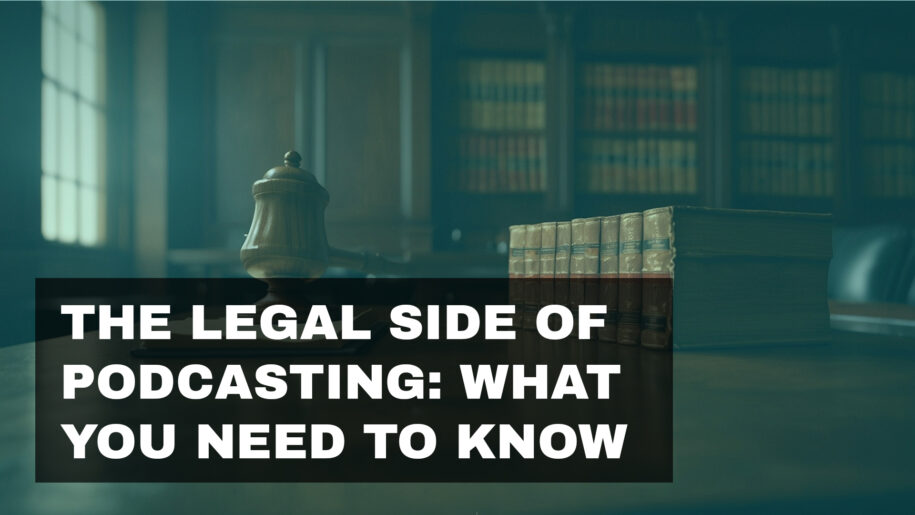Podcasting has grown into a popular medium for sharing stories, knowledge, and entertainment. However, with this growth comes the responsibility to understand the legal aspects of podcasting. Navigating the legal landscape is crucial to avoid potential pitfalls and ensure your podcast runs smoothly. In this blog post, we’ll cover the essential legal considerations for podcasters.
Why Legal Knowledge is Crucial for Podcasters
Understanding the legal side of podcasting helps protect your content, avoid lawsuits, and maintain a professional reputation. From copyright issues to privacy concerns, knowing your legal obligations and rights is fundamental to your podcast’s success.
Key Legal Considerations for Podcasters
1. Copyright Laws
- What It Is: Copyright laws protect the original works of creators, including music, audio clips, and written content.
- Why It Matters: Using copyrighted material without permission can lead to legal disputes and hefty fines.
- Tips:
- Use royalty-free music or obtain licenses for music you use.
- Create original content or ensure you have permission to use third-party content.
2. Trademark Issues
- What It Is: Trademarks protect brand names, logos, and slogans from being used without authorization.
- Why It Matters: Using a trademarked name or logo without permission can result in legal action.
- Tips:
- Conduct thorough research to ensure your podcast name and logo are not infringing on existing trademarks.
- Register your podcast’s name and logo to protect your brand.
3. Defamation and Libel
- What It Is: Defamation involves making false statements that harm someone’s reputation. Libel is defamation in written or recorded form.
- Why It Matters: Defamatory statements can lead to lawsuits and damage your podcast’s credibility.
- Tips:
- Verify the accuracy of your statements and avoid making unsubstantiated claims.
- Clearly distinguish between facts and opinions in your content.
4. Privacy Laws
- What It Is: Privacy laws protect individuals’ personal information from being disclosed without consent.
- Why It Matters: Violating privacy laws can result in legal penalties and loss of trust.
- Tips:
- Obtain consent before sharing personal information or stories about others.
- Be cautious when discussing sensitive topics and anonymize information when necessary.
5. Sponsorship and Advertising Regulations
- What It Is: Regulations governing how sponsorships and advertisements are disclosed in your podcast.
- Why It Matters: Failure to comply with these regulations can lead to fines and loss of sponsor trust.
- Tips:
- Clearly disclose any sponsored content or advertisements.
- Follow the guidelines set by regulatory bodies such as the Federal Trade Commission (FTC).
6. Content Licensing
- What It Is: Licensing agreements that allow you to use specific content legally.
- Why It Matters: Ensuring you have the proper licenses protects you from copyright infringement.
- Tips:
- Understand the terms of any licensing agreements you enter.
- Keep records of all licenses and permissions obtained.
Steps to Protect Your Podcast Legally
1. Consult a Legal Professional
- What It Is: Seeking advice from a lawyer specializing in intellectual property and media law.
- Why It Matters: A legal professional can provide tailored advice and help you navigate complex legal issues.
- Tips: Find a lawyer experienced in podcasting or digital media law for the best guidance.
2. Create Clear Terms of Service and Privacy Policy
- What It Is: Legal documents outlining the terms of use for your podcast and how you handle listeners’ data.
- Why It Matters: These documents protect your rights and inform listeners of their rights and obligations.
- Tips:
- Use clear and understandable language.
- Regularly update these documents to comply with changing laws.
3. Keep Detailed Records
- What It Is: Maintaining documentation of all permissions, licenses, and agreements.
- Why It Matters: Detailed records provide legal protection and help resolve disputes.
- Tips: Store records securely and back them up regularly.
4. Educate Yourself
- What It Is: Continuously learning about legal issues related to podcasting.
- Why It Matters: Staying informed helps you make better decisions and avoid legal problems.
- Tips: Follow reputable legal blogs, attend workshops, and participate in podcasting forums.
Real-Life Examples and Lessons
To illustrate the importance of legal knowledge in podcasting, let’s look at some real-life examples:
- Example 1: A popular podcast faced a lawsuit for using unlicensed music in their episodes. They had to pay substantial fines and remove the episodes, impacting their reputation and finances.
- Example 2: Another podcast was sued for defamation after making false claims about a public figure. The lawsuit resulted in legal fees and a public apology, highlighting the need for accurate reporting and fact-checking.
Navigating the legal side of podcasting is essential for protecting your content, avoiding disputes, and maintaining a professional reputation. By understanding copyright laws, trademark issues, defamation, privacy laws, and sponsorship regulations, you can create a legally sound podcast. Consulting a legal professional, creating clear terms of service, keeping detailed records, and educating yourself are key steps to safeguard your podcast.
Start addressing these legal considerations today to ensure your podcast’s success and longevity.


